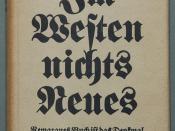Remarque's All Quiet on the Western Front, a novel set in World War I, centers around the changes brought by the war onto one young German soldier. During his time in the war, Remarque's protagonist, Paul Baumer, changes from a rather innocent romantic young man to a hardened and somewhat caustic veteran. The story also focuses on the lives of Baumer's comrades. They all begin by patriotically marching off to join the army. However, their visions of the glories of war are soon swept away with horror as true friends die in the battlefield. The soldiers go in fresh from school, knowing nothing except the environment of hopeful youth. At nineteen and twenty, they come to a premature and distorted maturity with the war...their only home. Throughout the length of the novel, Paul learns of the hardship war brings. He learns the destructiveness of war.
During the course of his experience with war, Baumer disaffiliates himself from those societal icons--parents, elders, school, and religion--that had been the foundation of his pre-enlistment days, in order to mature.
His new society, then, becomes the company, his fellow trench soldiers. They are a group who understands the truth as Baumer has experienced it. A period of leave when he visits his hometown is disastrous for Baumer because he realizes that he can not communicate with the people on the home front. His military experiences and the home front settlers' limited, or nonexistent, understanding of the war do not allow for a discussion. When he arrives home and greetings are exchanged, he realizes immediately that he has nothing to say to his mother. " We say very little and I am thankful that she asks nothing" (Ch. 7 P.141). The fact that he does not wish to speak with his parents shows Baumer's movement...


